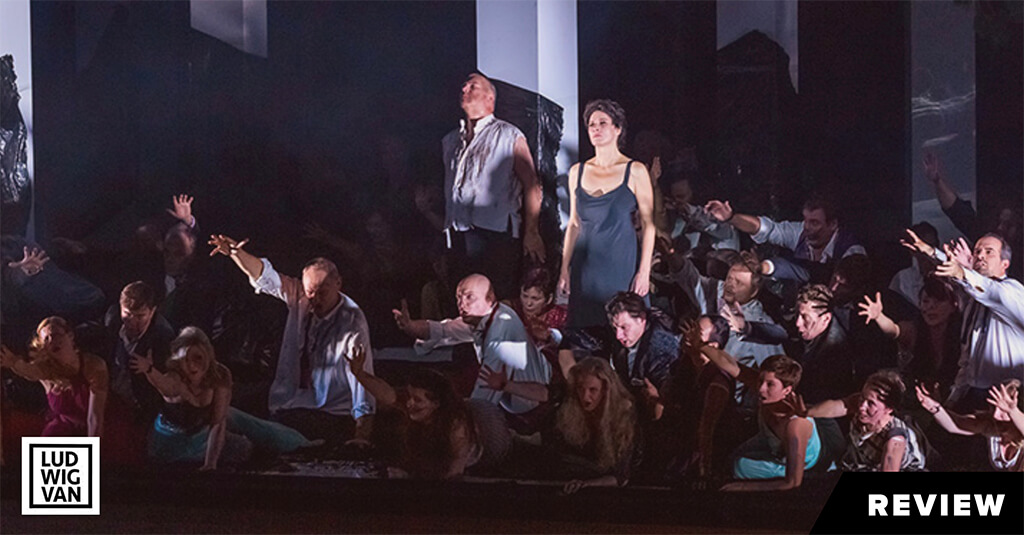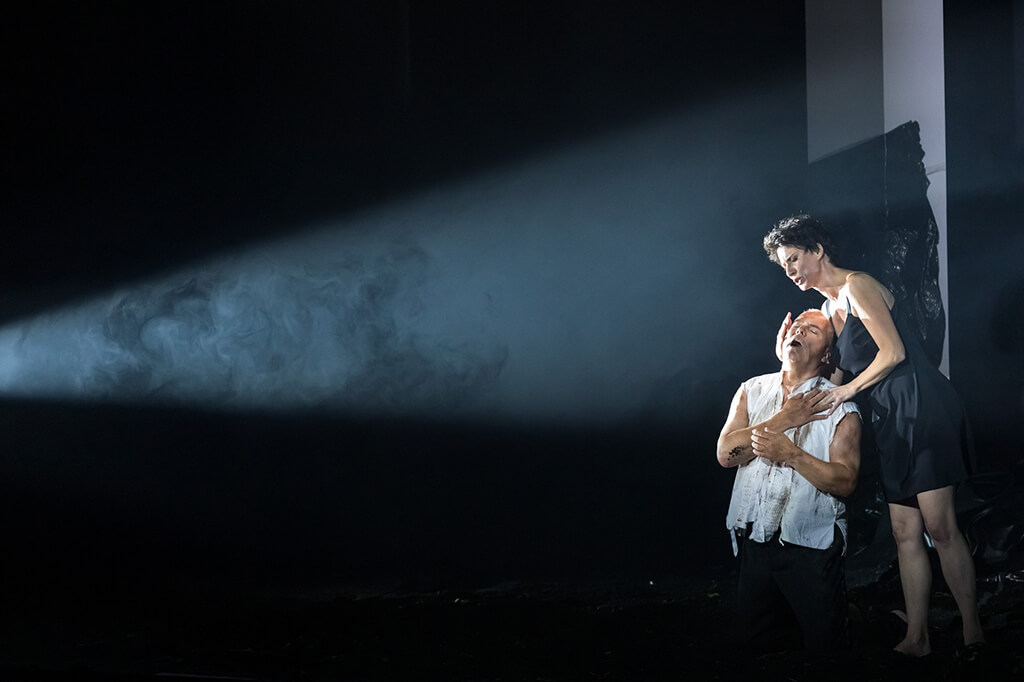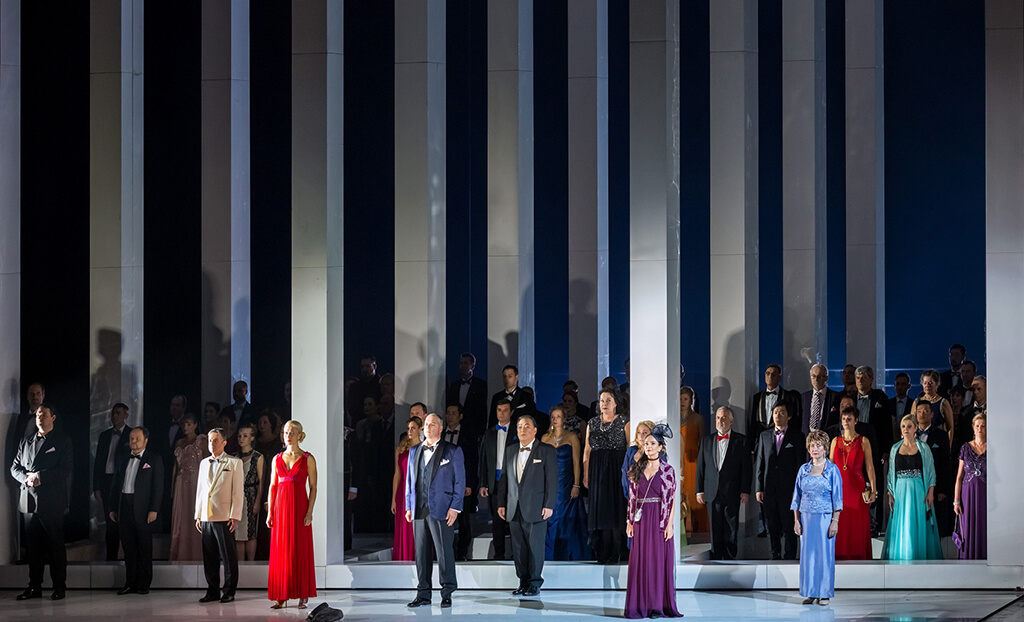
Wagner: Tannhäuser. Stefan Vinke/Daniel Frank (Tannhäuser), Elisabeth Strid (Elisabeth), Kathrin Göring (Venus), Markus Eiche (Wolfram)/Geert Smits (Act 3 Mar. 1), Ante Jerkunica (Landgrave), Patrick Vogel (Walther), Randall Jakobsh (Biterof); Gewandhausorchester und Chor Leipzig, Ulf Schirmer (conductor). Grand Theatre, Hong Kong Cultural Centre, March 1 and 2, 2019.
Founded in 1973 and now in its 47th season, the Hong Kong Arts Festival is a venue of choice for the discerning music lover who wants to experience performing arts that combine the best of the East and West, be it opera, classical music, jazz, world music, dance, and theatre. While HKAF has been on my radar for years now, flying halfway around the world to attend a performance does seem rather daunting. When I found out that Oper Leipzig would be on tour to the 2019 Festival with Wagner’s Tannhäuser, it was too good to pass up.
Oper Leipzig is one of the major opera houses in the former East Germany. A repertory company, it has no less than 37 works in its current season, from September 2018 to June 2019. Even the venerable Metropolitan Opera has only 29 productions in its current season. Leipzig, being the birthplace of Wagner, has a special affinity for his works. On the program this season is the Ring plus Der fiegende Holländer and Tannhäuser. In 2022, it’ll stage all 13 Wagner operas, including rarities like Die Feen and Das Liebesverbot, but I’m getting ahead of myself…
Katharina Wagner, the composer’s great-great-granddaughter and the head of the Bayreuther Festspiele, was originally announced as the director of this new Tannhäuser. But for reasons unknown, she withdrew and the task fell onto Spaniard Calixto Bieito. To be sure one of the best-known provocateurs of Regietheatre, Bieito will scandalize, amuse, anger, or touch his audience, but he’ll never bore them. My first exposure to Beieto was his Madama Butterfly at the Komische Oper Berlin a dozen years ago. It was, to put it mildly, unforgettable. Beieto turned the Act One love duet into an orgy; Cio-Cio-San stabbed Trouble, slashed Suzuki, and when Pinkerton came in at the end, she was waiting for him behind the shoji screen with a big sword. I had nightmares for days.
Then three years ago, I attended with much trepidation the new Calixto Bieito La Juive at the Bavarian State Opera in Munich. It turned out to be one of the most powerful and moving evenings at the opera I’ve ever experienced. Before a single note had sounded, the curtain rose to show young Jewish children with their heads pushed under water, in an act of forced baptism, all in total silence. It went straight to the heart of Halevy’s masterpiece of Christian-Jew conflict and persecution. Totally gut-wrenching and unforgettable. Would this Tannhäuser repeat the magic?
The strong cast was led by tenor Stefan Vinke, the COC Siegfried three years ago. He replaced Burkhard Fritz who sang in the premiere a year ago. Wolfram was the very fine lyric baritone Markus Eiche, whose excellent Golaud in the Munich Pelleas und Melisande I saw a few years ago. Reprising her Elisabeth was the wonderful jugendlich dramatischer sopran Elisabeth Strid, Sieglinde in Lyric Opera of Chicago’s Die Walkure. A co-production with Antwerp and Venice, this “concept production” drew divided opinions in Leipzig last year — highly praised for its musical values but vociferously booed for its staging on opening night.
Given that there were two performances on consecutive nights at the Festival, Stefan Vinke shared the title role with Daniel Frank. Tannhäuser ranks amongst the heaviest of heldentenor roles, on par with Siegfried and Tristan in Wagner and Otello in the Italian repertoire. Great tenors the likes of Canadian Jon Vickers never touched it. There are also three versions, and understandably Oper Leipzig chose the original, Dresden Version, which, unlike the later Paris Version, has a shorter Venusberg scene and no ballet.

The heart of this opera revolves around the struggle between the spirit and the flesh, the sacred and the profane. Elisabeth represents feminine purity, Venus the epitome of carnal desire. In Bieito’s take, the two archetypes are blurred. I can’t think of ever encountering any Elisabeth’s costume with such a plunging neckline and revealing cleavage. Venus for her part is in a little black cocktail dress reminiscent of Ariadne’s in the infamous Covent Garden Ariadne auf Naxos some years ago. Elisabeth is the object of desire, not only by Tannhäuser but also Wolfram and the minstrels. Wolfram’s love for her is overtly carnal, judging by the way he caresses and sniffs her shoes. At one point, Landgrave dances with a reluctant Elisabeth, and none of the men seem to be able to keep their hands off her.
I would be less than honest to say these directorial quirks didn’t bother me in first viewing. With all the men reduced to their basal instincts, the inherent spirituality of the story frankly goes out the window. It’s not helped by modern dress as costumes, and a set that does not attempt to evoke the proper era and any sense of spirituality. There are plenty of other directorial idiosyncrasies — for example, Venus has her thrills playing with the hanging tree branches at the opening of Act One, and there are liberal uses of said foliage as weapons beating each other up, much like Bieito’s La Juive in Munich. Tannhauser’s fellow minstrels behave more like thugs than participants in a song contest, proceeding to smear each other with fake blood, signifying brotherhood, perhaps?
The Hall of Song is made up of sixteen tall, white pillars, aesthetically cold, and they have the effect of blocking some of the singers from view. In Act Two, all are costumed in opulent evening attire, as it they are attending some glittery social function. All these touches, while quirky, are minor when compared to the most radical twist in the story in Act 3. When Tannhäuser doesn’t return from Rome, Elisabeth is despondent and tries to kill herself. She is saved by Wolfram. But when she proceeds to pray for Tannhäuser’s redemption in her beautiful “Allmachtige Jungfrau,” Wolfram, in a rage, strangles her.
Seeing it for the first time, it was quite shocking. When I saw it again the following evening, I gained more of an idea of what Bieito was driving at. Perhaps he wishes to expose the underbelly of religious hypocrisy, especially when it comes to sexuality? Tannhäuser may represent European High Romanticism, its kernel of truth is decidedly not one of beauty. Yes, I would have preferred less quirky staging – do we really need to see the tenor takes his pants off? But these things are minor. What I object to most is the twist of Wolfram strangling Elisabeth, something that’s simply not part of the narrative. It’s not Wagner and not Tannhäuser.
I’m happy to report that musically this Tannhäuser was a complete triumph. Kudos to the magnificent playing by the Gewandhausorchester under the direction of Ulf Schirmer. A Wagner-Strauss specialist, Maestro Schirmer elicited fabulous sonorities from the pit, with strings, brass and woodwind to die for. The Oper Leipzig Chorus was exemplary, and this opera really shows them off! (I also attended a separate chorus concert given the following night, solidifying my first impressions.)
The Grand Theatre has about 1,500 seats, just the ideal size for opera, with excellent acoustics. I was fortunate to have great seats, but from what I could tell, there are no bad seats in the house. There was one quirk that I noticed — the three huge monitors designed for the singers to see the conductor give off so much light that it’s very noticeable and a bit disconcerting to the audience.

Any Tannhäuser performance lives and dies by its lead tenor, and Oper Leipzig brought two of the best tenors to the HKAF. Stefan Vinke (Mar. 1) was indefatigable, just like his Siegfried in Toronto. His trumpet of a voice remains remarkable, doing full justice to this punishing role, always beautifully sung if just a touch too stentorian in his approach. The voice of Swedish tenor Daniel Frank was unfamiliar to me until now. Well, what a revelation! Frank has a gorgeous instrument, rich, even from top to bottom, with a completely secure top register, and a timbre not unlike Klaus Florian Vogt except stronger, with more oomph. And he sings with discerning taste and musicality. His Rome Narrative among the best I’ve heard. I also noticed some differences in the staging – he did not mime the harp-playing in the Venusberg scene, and he kept his undershorts on during the clothes changing!
Soprano Elisabeth Strid was a sympathetic Elisabeth, offering gleaming tone in “Dich teure Halle” and a poised, heartfelt “Allmachtige Jungfrau.” Compared to the Paris version, Venus in the Dresden version has less music, and Kathrin Göring was completely up to the task, singing strongly albeit with a slightly intrusive vibrato at the climaxes. Ante Jerkunica (Landgrave) has a fine basso cantante, slightly dry of timbre (on the first night) but fine in the second performance, with all the requisite gravitas one would want.
Baritone Markus Eiche was announced as under the weather at the start of Act 3. He mimed onstage while baritone Geert Smits, dress in black concert attire, sang from the side, very impressively I might add. It’s a real indicator of the artistic depth of Oper Leipzig to have a cover artist of such calibre. To everyone’s relief, Eiche was back in top form in the second performance. Interestingly there was a Canadian in the cast, BC bass-baritone Randall Jakobsh (Biterolf), who has spent most of his career in Europe, now a stalwart in the Oper Leipzig Ensemble.
There you have it, a musically superb Tannhäuser, even if the staging is not to everyone’s taste. I admit that my focus is first and foremost on the glorious music, and this show really whet my appetite for the 2022 Oper Leipzig’s Wagner Festtage, with all thirteen Wagner’s operas in a three week period. Not to be missed!



